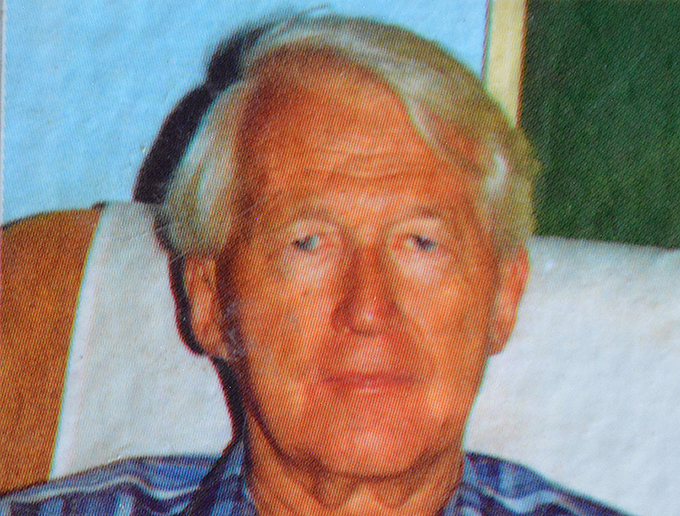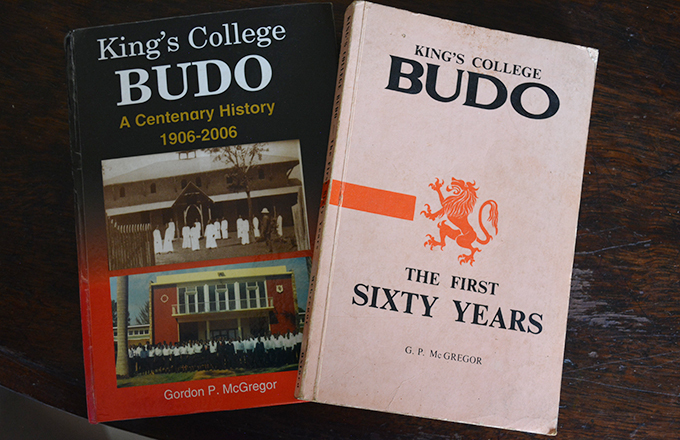The Chronicler of King's College Budo
Gordon P. McGregor, teacher in great African institutions, died January 5th, aged 86
By David Sseppuuya
Gordon P. McGregor
Born: Aldershot, England, 1932
Career: Teacher, King's College Budo, 1959-62; Lecturer, Makerere University College, 1963-66; Lecturer/Professor, University of Zambia, 1970; Principal Bishop Otter College, Chichester (University of Sussex) 1970-80; Hon Visiting Prof, University of Fort Hare, South Africa, 1997, Makerere University 1998-2007, Oxford Brookes University 2001-2009; Chair Uganda Universities Visitation Committee 2006-7.
Died: January 5, 2019, England
The passing of an elder, says an old African adage, is like a library going up in flames. Gordon P. McGregor has turned this proverb somewhat on its head, he being neither African nor one to be interred with all his knowledge, while simultaneously testifying to the wisdom of our forefathers.

A repository of knowledge and fountain of wisdom he was, now gone from our midst. Of his major work, "King's College Budo: A Centenary History 1906-2006", Prof ABK Kasozi commends: "Students of the history of education should read this book… it is a micro description, at a single institutional level, of the growth of formal education in Uganda."
Education was McGregor's specialty, from teaching in the Royal Air Force in England to Budo in Uganda and on to three of Africa's premier universities, before a late sojourn home to head a college at the University of Sussex.
Makerere University, where he lectured in English Language in the Education Faculty is, of course, alma mater for many Africans, some great and others not so great, while the University of Zambia, where he was the first Professor and Head of the Department of Education, remains the ivory tower of that country even in these days of what Prof Mahmood Mamdani wryly notes to be "higher education (that) is a business, (where) the consumer must pay the price of the product".
Fort Hare, where McGregor served as Visiting Professor during retirement (post-Apartheid), has the indelible record of training many leading Africans, including former Ugandan President and old Budonian, Prof Yusuf Kironde Lule, in the worst years of white rule. Fort Hare distinguished itself as the main (and possibly only) degree-awarding institute where black South Africans and scholars from elsewhere on the continent could get a genuinely first class education in Apartheid South Africa.
Blind to colour and free of colonial condescension, McGregor held no prejudices, teaching at a school for the blind in England, before coming to Budo, an elite school in rural Uganda, in 1959. Bryan Wilson, a colleague at Budo, recalls that McGregor and his wife Jean had both been interested in the rapid changes going on in many African countries in the pre-Independence era of the 1950s. "Gordon had
been teaching at a school for blind students for some years, and realised that this was a very specialised area and that he needed to get wider experience. He looked at advertisements for teaching posts in Africa in the Times Educational Supplement, found one for Budo which said that it was to prepare for the introduction of HSC [Higher School Certificate, otherwise known as A' Level] (up until then Ugandan schools only went as far as SC), and received a most welcoming letter from Ian Robinson, the headmaster."

That began a love affair with education in Africa, and he had, in four years, learned enough of his new setting to be able to write an authoritative institutional biography, "King's College Budo: The First Sixty Years", his first book, in 1966.
It is a book that was fortuitous in its publication, coming out a few years after Independence and in the year that marked a turning point in Uganda's political fortunes. He had relied mainly on the daily log that the school's headmasters make of noteworthy events, whether visits by luminaries, school productions, or the occasional crisis that threatens to get out of hand. It helped that he was deeply involved in school life, being in charge of swimming, the clothing store, assistant housemaster of the newly formed Ghana House, and cricket coach. He was a player in his own right, as Wilson recalls: "He was also a very good cricketer, a fast bowler. He and I used to play for Entebbe Cricket Club on Saturdays; I got the runs and he took the wickets! Fortunately the club season was different from the school cricket term, so we coached at Budo as well, and produced some of Uganda's finest cricketers, such as Sam Walusimbi, Dan Kigozi (later Minister of Works in the NRM Government) and Sandy Kizito."
The book's sequel, for that is what it was, marking the centenary, was published in 2006, skillfully weaving the goings-on at school with Uganda's social-political developments. McGregor had indicated, in the final paragraphs of "The First Sixty Years", that "Budo needs Christian Africans…it will, no doubt, be such an African who will chronicle the next 60 years. When he does, he will see even more clearly than we can, the force of (founding headmaster) Weatherhead's motto, ‘Gakyali Mabaga' - ‘we are still at the tying'. What has been done is only a beginning."
This writer took him up on this challenge and, with the help of Chris Luswata and Paul Bakibinga of the Old Budonians Association UK, looked him up in England in 1999. It was with the hope of taking up the mantle of the succeeding (40) years, in the run up to the centenary. McGregor, still strong of mind and limb, was not yet ready to relinquish the chronicler's nib and ink, and the result was the imperious "A Centenary History 1906-2006". It is a book Luswata, then resident in the UK and now President of the Old Budonians Club (alumni association of King's College and Budo Junior School) in Kampala, was consulted on. Luswata remembers McGregor as an active and dedicated member of the UK branch who, at the annual reunions, "was never one to sit quietly in the corner".
McGregor probably was a little quieter at home where, as he listed his many hobbies (Music, Literature, Theatre, Film/TV, travel/cruising, swimming), included, rather cheekily, the pastime of "watching my wife bird-watching". There was a solid side to him, though, one of which Wilson recalls: "A Budonian died during a charity road race and Gordon was asked to speak at his memorial service in the school Chapel. After expressing for all of us our deep sadness, he said, 'But life must go on'. It was very helpful, as the whole Budo community was in shock - but we had to look forward and resume the vital work of education that we were all, staff and students, engaged in, and not let ourselves be paralysed by what had happened."
Twenty years after this writer's reach-out to McGregor, limb was to fail him, and he slipped and fell, the complications thereof leading to his death on 5 January, still lucid of memory and sharp in the writing.
"A Centenary History" was McGregor's seventh title, and more were to follow to make the following catalogue: "Educating the Handicapped", 1967; "English for Education?" 1968; "Teaching English as a Second Language" (with JA Bright), 1970; "English in Africa" (UNESCO), 1971; "Bishop Otter College and Policy for Teacher Education 1839-1980", 1981; "A Church College for the 21st Century? 150 Years of Ripon and York St John", 1991; "Towards True Education", 1994; "English for Life?" 2002; "Kings' College Budo: A Centenary History", 2006; "Life More Abundant: York St John University 1841-2008", (2009); "In and Out of Class: Ventures in Education, a Memoir" (Matador), 2017. A Jewish proverb says "One should sell all he possesses and buy books, for as the sages put it, ‘He who increases books, increases wisdom'." McGregor has done his bit to increase wisdom and preserve knowledge. His departure is not a library aflame; more the loss of a sprightly intellectual, a contributor to histories and knowledge, now stacked on shelves and (hopefully) stored in cloud. He has done his bit of the tying.
Prof McGregor is survived by his wife, Jean, and three daughters: Clare was an eight-month-old baby when they arrived at Budo in January 1959. She is now married and lives in Holland with her Dutch husband. Helen was born in Mengo Hospital in 1962 and spent her infancy on Budo hill, and Fiona was born at the end of 1963, in the then new Mulago Hospital after McGregor had moved to Makerere. They now both live in England.
There will be a memorial service on January 30.